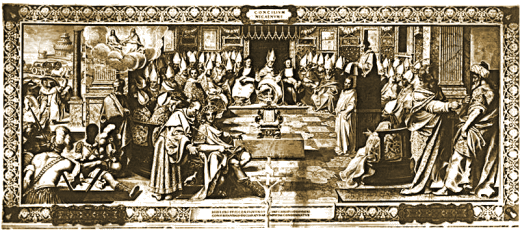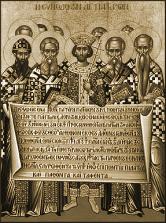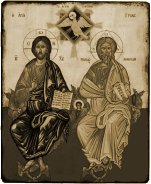
The Council of Nicea
 The Council of Nicea was convened by Emperor Constantine in 325 and is widely seen as the foundational moment for the organized christian church. At the time, the reason for the gathering was a doctrinal controversy over the relationship between Jesus and God. Were they on equal footing [co-eternal] as the Latin speaking Bishops taught? or was Jesus a creation of God, as claimed by Greek speaking Arians? After months of debate, the Bishops overwhelmingly favored the former view and Arius’ beliefs were denounced. The back story was the fear that if Jesus were simply a creation of God, that would interfere with the winning of souls and the growth of the church. The decision was revised somewhat by the Council of Constantinople in 360 AD which canonized the Trinity – the "God in three persons" doctrine. The political importance of the Councils was the establishment of authority of the church and its alliance with the state. The essential question couldn’t possibly be answered objectively – was Jesus divine or just a man? So it was answered based on the implications of the decision for the future of the church and to resolve the dispute over power between the eastern and western church leadership. That decision came to define Christianity in its current form – the divinity of Jesus became the doctrine to the present.
The Council of Nicea was convened by Emperor Constantine in 325 and is widely seen as the foundational moment for the organized christian church. At the time, the reason for the gathering was a doctrinal controversy over the relationship between Jesus and God. Were they on equal footing [co-eternal] as the Latin speaking Bishops taught? or was Jesus a creation of God, as claimed by Greek speaking Arians? After months of debate, the Bishops overwhelmingly favored the former view and Arius’ beliefs were denounced. The back story was the fear that if Jesus were simply a creation of God, that would interfere with the winning of souls and the growth of the church. The decision was revised somewhat by the Council of Constantinople in 360 AD which canonized the Trinity – the "God in three persons" doctrine. The political importance of the Councils was the establishment of authority of the church and its alliance with the state. The essential question couldn’t possibly be answered objectively – was Jesus divine or just a man? So it was answered based on the implications of the decision for the future of the church and to resolve the dispute over power between the eastern and western church leadership. That decision came to define Christianity in its current form – the divinity of Jesus became the doctrine to the present.
Sounds familiar to me. The final result of such a process is the establishment of a bastion – a set of beliefs that are declared absolutely true. So all ideas must first be measured against the core truths before being considered in their own right. The outside force in the issue of psychiatric nosology was the continued inclusion of psychiatry in the domain of medicine from the perspective of third party payers. Previous classifications had divided depressive illness into two general groups based clinical features, treatment methods, and presumed [but unproven] etiology. In this case, the central issue was not the divinity of Jesus, it was the divinity of Depression as a valid medical illness. With Depressive Neurosis as part of our nosology with an openly stated psychological cause, divinity was in no way assured [it was, in fact, doomed]. The operational problem inside of psychiatry was that the analysts and the even larger group of dynamically oriented psychiatrist psychotherapists had become used to receiving third party payments for their work.
But from the point of view of the insurers, some biologically oriented psychiatrists, and the pharmaceutical industry, the particular view of the neoKraepelinians in Saint Louis was tailor-made to solve the problem, whether by chance or design:
The problem with dogmatic decisions is that they can create endless new problems, and the classification of depression has certainly done that. Given the objections, why has a unitary category for depression remained essentially unchanged through three major revisions? It was a bad idea the first time around, but it remains chiseled in granite. I would argue that there are concrete reasons it is like it is and will not be revised. First, any other diagnostic category for depression [no matter what you named it] would run into trouble. It would unlikely have a distinct boundary [4.] and would contain patients whose illness was more clearly psychological/characterological – reopening a door that seems welded shut by the decisions in 1980 with the DSM-III. Second, it would dramatically shrink the population of depressed patients in the biological category – the new "meat and potatoes" of psycho-pharmaceutical practice. Keeping it broad then serves two purposes. It staves off any resurgence of psychosocial causality while broadening the base for biological treatments. The unitary Major Depression diagnosis appears for the moment to be Canonized.

 Constantine seems to have had more skills than the American Psychiatric Association sixteen centuries later. Constantine’s charge to the Council of Nicea was unification, and he reportedly walked among the delegates in regal attire without engaging in their debates. The compromise in the battle between God and Jesus for divinity picked neither as "winner" but attempted to find another solution to the conflicting views. The first solution was not completely successful, and the "one or two gods?" debate continued. So 35 years later, the Council of Constantinople met and made another wise compromise – neither one nor two, but three – Father, Son, and Holy Ghost. Both decisions aimed at unification and inclusion by transcending the divisive debate, beginning a unification that has endured into its second Millennium.
Constantine seems to have had more skills than the American Psychiatric Association sixteen centuries later. Constantine’s charge to the Council of Nicea was unification, and he reportedly walked among the delegates in regal attire without engaging in their debates. The compromise in the battle between God and Jesus for divinity picked neither as "winner" but attempted to find another solution to the conflicting views. The first solution was not completely successful, and the "one or two gods?" debate continued. So 35 years later, the Council of Constantinople met and made another wise compromise – neither one nor two, but three – Father, Son, and Holy Ghost. Both decisions aimed at unification and inclusion by transcending the divisive debate, beginning a unification that has endured into its second Millennium.
His "atheoretical" classification was based on a theory [or set of pronouncements]. It assumed a fixed trajectory for psychiatry, namely
n.
The sudden overthrow of a government by a usually small group of persons in or previously in positions of authority.
Very interesting comparison…the theology of psychiatry is very much like a modern cult/religion…the illusion of evidenced based science is used to support a hypothetical concoction.
they Create criteria that fits nicely into the fluctuation of culture, and have means (drugs etc.) set in place to treat the created cleverly marketed need.
Psychiatry then can rewrite the criteria and make adjustments on the go; always promising something it can never deliver (relief from the human condition)…..It’s the greatest Con of the 21st century..